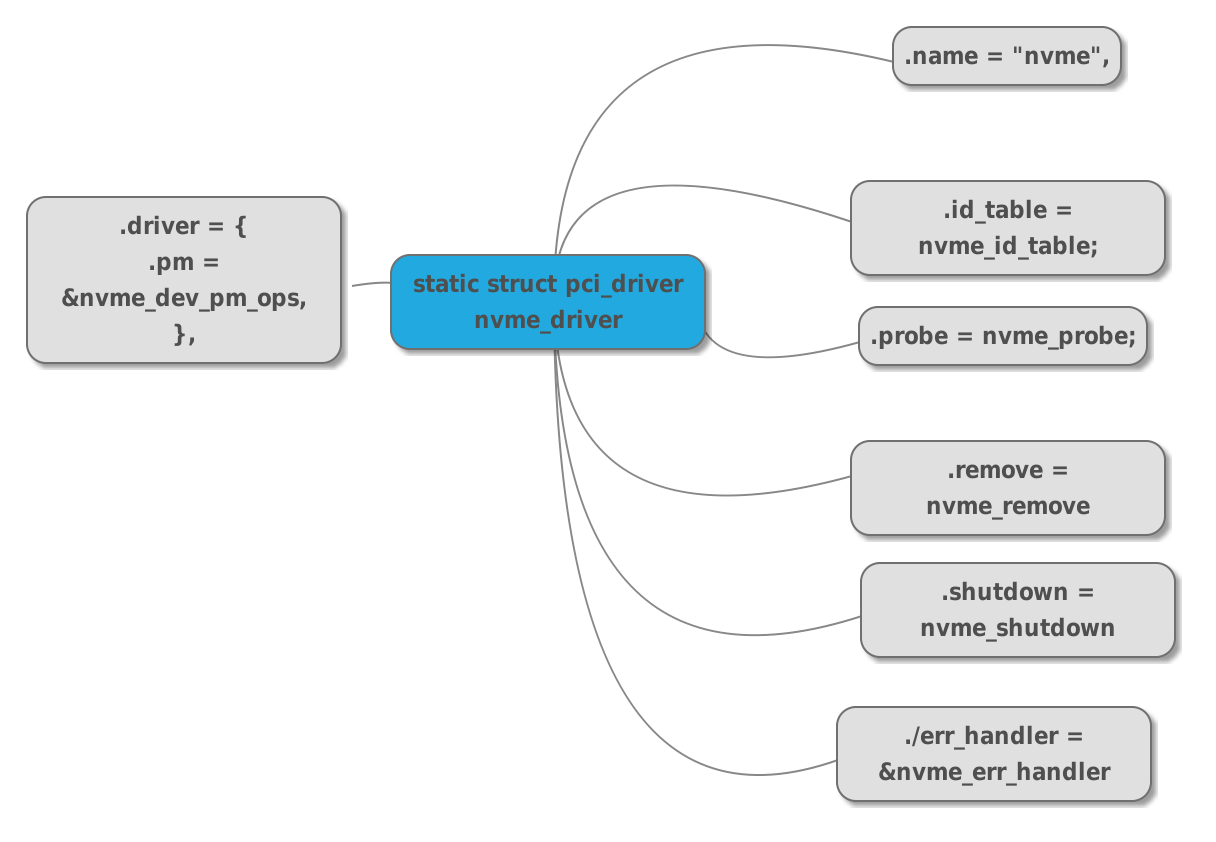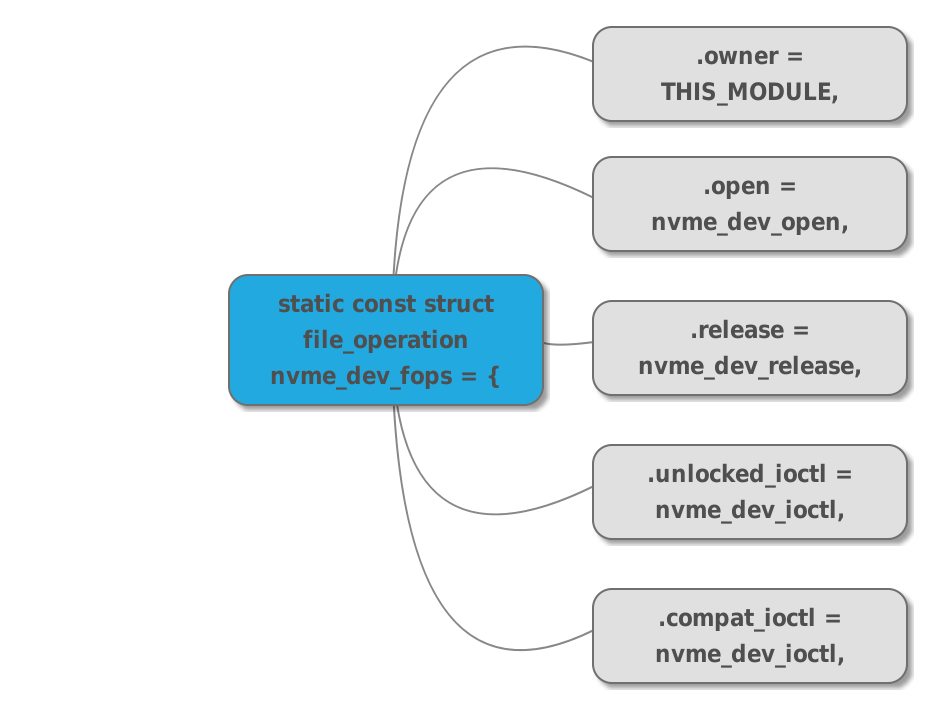I’m doing analysis about nvme driver source code of linux kernel version 4.5, refering to this URL
Initialization of nvme pci module.
As you can see 2294 module_init(nvme_init);in pci.c file, First of all You have to search for this function,”2256 static int __init nvme_init(void)”
the following is information of nvme driver.
2291 MODULE_AUTHOR(“Matthew Wilcox ~~~”);
2292 MODULE_LICENSE(“GPL”);
2293 MODULE_VERSION(“1.0”);
2294 module_init(nvme_init);
2295 module_exit(nvme_exit);
Flow of static int _init nvme_int(void); of moudle_init(nvme_init)
.png)
&Nvme_driver of pci_register_driver(&nvme_driver)
basically, the following is a original shape(pci_driver) of nvme_driver for pci_register_driver function

665 <a href ="http://lxr.free-electrons.com/source/include/linux/pci.h?v=4.5#L665">struct pci_driver</a> {
666 struct list_head node;
667 const char *name;
668 const struct pci_device_id *id_table; /* must be non-NULL for probe to be called */
669 int (*probe) (struct pci_dev *dev, const struct pci_device_id *id); /* New device inserted */
670 void (*remove) (struct pci_dev *dev); /* Device removed (NULL if not a hot-plug capable driver) */
671 int (*suspend) (struct pci_dev *dev, pm_message_t state); /* Device suspended */
672 int (*suspend_late) (struct pci_dev *dev, pm_message_t state);
673 int (*resume_early) (struct pci_dev *dev);
674 int (*resume) (struct pci_dev *dev); /* Device woken up */
675 void (*shutdown) (struct pci_dev *dev);
676 int (*sriov_configure) (struct pci_dev *dev, int num_vfs); /* PF pdev */
677 const struct pci_error_handlers *err_handler;
678 struct device_driver driver;
679 struct pci_dynids dynids;
680 };
The following is when init function calls the pci_register_driver with &nvme_driver
in pci.c file, The following structure is intialized as follows.
2244 static struct pci_driver nvme_driver = {
2245 .name = "nvme",
2246 .id_table = nvme_id_table,
2247 .probe = nvme_probe,
2248 .remove = nvme_remove,
2249 .shutdown = nvme_shutdown,
2250 <a href = "http://lxr.free-electrons.com/source/include/linux/device.h?v=4.5#L260">.driver</a> = { // device driver structure.
2251 .pm = <a href ="http://lxr.free-electrons.com/source/include/linux/pm.h?v=4.5#L295">&nvme_dev_pm_ops,</a> // this function is associated with power management interface.
2252 },
2253 .err_handler = &nvme_err_handler,
2254 };
2255
each role of pci_driver variable is here
What is role of probe() function in driver.
If you want to know probe(), I recommend you have to read this URL
In linux kernel code 4.5 version, Page with device_driver structure explain to me about role of probe() function.
That is @probe called to query the existence of a specific device, Whether this driver can work with it, and bind the driver to a specific device.
227 /**
228 * struct device_driver - The basic device driver structure
229 * @name: Name of the device driver.
230 * @bus: The bus which the device of this driver belongs to.
231 * @owner: The module owner.
232 * @mod_name: Used for built-in modules.
233 * @suppress_bind_attrs: Disables bind/unbind via sysfs.
234 * @probe_type: Type of the probe (synchronous or asynchronous) to use.
235 * @of_match_table: The open firmware table.
236 * @acpi_match_table: The ACPI match table.
237 * @probe: Called to query the existence of a specific device,
238 * whether this driver can work with it, and bind the driver
239 * to a specific device.
240 * @remove: Called when the device is removed from the system to
241 * unbind a device from this driver.
242 * @shutdown: Called at shut-down time to quiesce the device.
243 * @suspend: Called to put the device to sleep mode. Usually to a
244 * low power state.
245 * @resume: Called to bring a device from sleep mode.
246 * @groups: Default attributes that get created by the driver core
247 * automatically.
248 * @pm: Power management operations of the device which matched
249 * this driver.
250 * @p: Driver core's private data, no one other than the driver
251 * core can touch this.
252 *
253 * The device driver-model tracks all of the drivers known to the system.
254 * The main reason for this tracking is to enable the driver core to match
255 * up drivers with new devices. Once drivers are known objects within the
256 * system, however, a number of other things become possible. Device drivers
257 * can export information and configuration variables that are independent
258 * of any specific device.
259 */
260 struct device_driver {
261 const char *name;
262 struct bus_type *bus;
263
264 struct module *owner;
265 const char *mod_name; /* used for built-in modules */
266
267 bool suppress_bind_attrs; /* disables bind/unbind via sysfs */
268 enum probe_type probe_type;
269
270 const struct of_device_id *of_match_table;
271 const struct acpi_device_id *acpi_match_table;
272
273 int (*probe) (struct device *dev);
274 int (*remove) (struct device *dev);
275 void (*shutdown) (struct device *dev);
276 int (*suspend) (struct device *dev, pm_message_t state);
277 int (*resume) (struct device *dev);
278 const struct attribute_group **groups;
279
280 const struct dev_pm_ops *pm;
281
282 struct driver_private *p;
283 };
Nvme_drv_fops in __register_chrdev(nvme_char_major, 0, NVME_MINORS, “nvme”, &nvme_drv_fops);
The following is basic fileoperation structure of linux 4.5
1627 <a href="http://lxr.free-electrons.com/source/include/linux/fs.h?v=4.5#L1627">struct file_operations</a> {
1628 struct module *owner;
1629 loff_t (*llseek) (struct file *, loff_t, int);
1630 ssize_t (*read) (struct file *, char __user *, size_t, loff_t *);
1631 ssize_t (*write) (struct file *, const char __user *, size_t, loff_t *);
1632 ssize_t (*read_iter) (struct kiocb *, struct iov_iter *);
1633 ssize_t (*write_iter) (struct kiocb *, struct iov_iter *);
1634 int (*iterate) (struct file *, struct dir_context *);
1635 unsigned int (*poll) (struct file *, struct poll_table_struct *);
1636 long (*unlocked_ioctl) (struct file *, unsigned int, unsigned long);
1637 long (*compat_ioctl) (struct file *, unsigned int, unsigned long);
1638 int (*mmap) (struct file *, struct vm_area_struct *);
1639 int (*open) (struct inode *, struct file *);
1640 int (*flush) (struct file *, fl_owner_t id);
1641 int (*release) (struct inode *, struct file *);
1642 int (*fsync) (struct file *, loff_t, loff_t, int datasync);
1643 int (*aio_fsync) (struct kiocb *, int datasync);
1644 int (*fasync) (int, struct file *, int);
1645 int (*lock) (struct file *, int, struct file_lock *);
1646 ssize_t (*sendpage) (struct file *, struct page *, int, size_t, loff_t *, int);
1647 unsigned long (*get_unmapped_area)(struct file *, unsigned long, unsigned long, unsigned long, unsigned long);
1648 int (*check_flags)(int);
1649 int (*flock) (struct file *, int, struct file_lock *);
1650 ssize_t (*splice_write)(struct pipe_inode_info *, struct file *, loff_t *, size_t, unsigned int);
1651 ssize_t (*splice_read)(struct file *, loff_t *, struct pipe_inode_info *, size_t, unsigned int);
1652 int (*setlease)(struct file *, long, struct file_lock **, void **);
1653 long (*fallocate)(struct file *file, int mode, loff_t offset,
1654 loff_t len);
1655 void (*show_fdinfo)(struct seq_file *m, struct file *f);
1656 #ifndef CONFIG_MMU
1657 unsigned (*mmap_capabilities)(struct file *);
1658 #endif
1659 ssize_t (*copy_file_range)(struct file *, loff_t, struct file *,
1660 loff_t, size_t, unsigned int);
1661 int (*clone_file_range)(struct file *, loff_t, struct file *, loff_t,
1662 u64);
1663 ssize_t (*dedupe_file_range)(struct file *, u64, u64, struct file *,
1664 u64);
1665 };
the following is structure the nvme driver uses for register of __register_chrdev of nvme

1009 static const struct file_operations nvme_dev_fops = {
1010 .owner = THIS_MODULE,
1011 .open = nvme_dev_open,
1012 .release = nvme_dev_release,
1013 .unlocked_ioctl = nvme_dev_ioctl,
1014 .compat_ioctl = nvme_dev_ioctl,
1015 };